Making an ordinary day worth remembering
December 1, Thursday
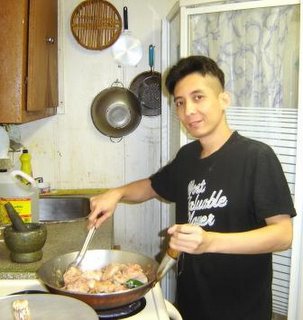 Today was Grandfather's appointment with a urologist, Dr. Graham Glezerson, at Manitoba Clinic on Sherbrook Street. The result of grandfather's urinalysis conducted several weeks ago revealed a hematuria, so his physician, Dr. Tsang, recommended him to the specialist. Unfortunately, everyone had work so no one could drive us there. Tito Ren said that we call a cab instead.
Today was Grandfather's appointment with a urologist, Dr. Graham Glezerson, at Manitoba Clinic on Sherbrook Street. The result of grandfather's urinalysis conducted several weeks ago revealed a hematuria, so his physician, Dr. Tsang, recommended him to the specialist. Unfortunately, everyone had work so no one could drive us there. Tito Ren said that we call a cab instead.Unlike in the Philippines where I used to live, getting a cab here in Canada where I am is easy. All one needs to do is phone a taxi company and ask for a cab to pick you up. After only a few minutes, the taxi's already there.
After breakfast around 9:30 a.m., I gave Grandfather a bath. After getting him all ready, I took a bath myself. I made sure that all the stuff we might be needing were inside my backpack: Grandfather's medications, my little address book, my journal, and a book to read. Most importantly, I made sure that both Grandfather and I were well-clad on a snowy day—headgear, gloves, and layers of clothes.
 Right after Grandfather and I had finished lunch, I picked up the phone and called Unicity Taxi. After about ten minutes, the cab was already outside the house. The trip took about ten minutes and costed C$9.
Right after Grandfather and I had finished lunch, I picked up the phone and called Unicity Taxi. After about ten minutes, the cab was already outside the house. The trip took about ten minutes and costed C$9.Grandfather's appointment was 1:15, and we arrived at Manitoba Clinic at 12:35. Good! We still had time to relax at the clinic's lobby. Manitoba Clinic was not that impressive a medical center. In fact, the milieu reminded me of University of Santo Tomas Hospital in the Philippines.
While we were at a waiting area in the lobby, I noticed that someone was painting the glass doors of the adjacent room. The "glass artist" was painting a Santa Claus. Wow! If not for things like that I would have forgotten that Christmas is just 'round the corners. Being in the house virtually most of the time, even the Christmas lights and other decorations on the houses in the neighborhood I could no longer notice. White Christmas anyway? Oh, believe me, as I always say, snow is lovely only during its first fall; and a Winter Wonderland looks wonderful only when viewed from behind the glass windows of one's heater-warmed room.
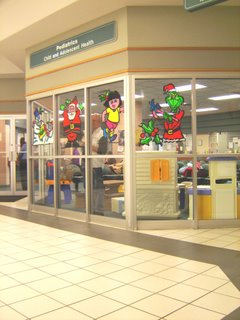 Here where I am, I don't look forward to the advent of the Christmas season because this only makes me sad.
Here where I am, I don't look forward to the advent of the Christmas season because this only makes me sad.Of course, Christmas is a season when families and friends try to be kinder and closer with each other; and obviously, for someone like me who is far away from home, achieving physical closeness is impossible. Nonetheless, I look forward to the passing of New Year, for this would mean that I'm getting closer and closer to freedom and, most especially, to my planned homecoming.
We headed to the fourth floor where the physician's clinic was located. There were already a number of clients inside Dr. Glezerson's clinic. We registered at 1 p.m.; and since Grandfather's appointment was 1:15, I was expecting that the medical secretary would call Grandfather's name on time. It was already about 2:30 when the medical secretary uttered, Mr. Conrado Vera.
I just proved again that the so-called Filipino time is not exclusively Filipino after all. I surmise that tardiness or procrastination is a universal human tendency. In fact, there were those two elderly ladies seated near me who were conversing about the failure of the secretary to call their names on time. One of the ladies said that it was also the case during their previous visit.
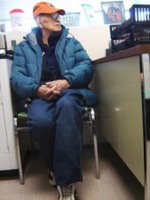
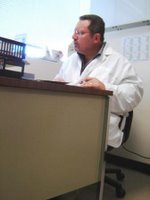 After reviewing the results of Grandfather's laboratory tests, Dr. Glezerson told me that he had to perform a cystoscopy so he could know the source of the blood in Grandfather's urine. The procedure would also tell if there was a presence of cancerous cells. Admittedly I never had any iota of worry about whatever results the procedure would render. I've long accepted that Grandfather's age, 90, is in fact already past the expected lifespan nowadays. Even Grandfather was, as always, oblivious about what the doctor was telling me. I'm unsure if either he just no longer cared about dying or his mind could simply no longer cope with fast conversations like that sprinkled with medical lingo.
After reviewing the results of Grandfather's laboratory tests, Dr. Glezerson told me that he had to perform a cystoscopy so he could know the source of the blood in Grandfather's urine. The procedure would also tell if there was a presence of cancerous cells. Admittedly I never had any iota of worry about whatever results the procedure would render. I've long accepted that Grandfather's age, 90, is in fact already past the expected lifespan nowadays. Even Grandfather was, as always, oblivious about what the doctor was telling me. I'm unsure if either he just no longer cared about dying or his mind could simply no longer cope with fast conversations like that sprinkled with medical lingo.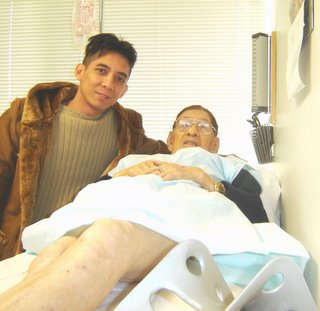 After another urinalysis and the cystoscopy, Dr. Glezerson coolly told me that Grandfather's kidneys and urinary bladder were relatively fine and that the bleeding was coming from the prostate; and that there was no need for another operation (Several years ago, Grandfather had already been operated because of a problem in the prostate.) Dr. Glezerson said that leaving Grandfather's prostate untouched would be the best thing to do. Besides, Grandfather is already too old to survive another major surgery.
After another urinalysis and the cystoscopy, Dr. Glezerson coolly told me that Grandfather's kidneys and urinary bladder were relatively fine and that the bleeding was coming from the prostate; and that there was no need for another operation (Several years ago, Grandfather had already been operated because of a problem in the prostate.) Dr. Glezerson said that leaving Grandfather's prostate untouched would be the best thing to do. Besides, Grandfather is already too old to survive another major surgery.I noticed Grandfather's paleness after the cystoscopy. I was unsurprised for the procedure was indeed painful. Imagine a tube being inserted into the penis; but, don't lose heart, the physician usually applies an anaesthetic gel prior to the procedure. But still...ouch!
Another observation I had was, the rooms in the clinic were neat and the things in there were arranged in an orderly manner.
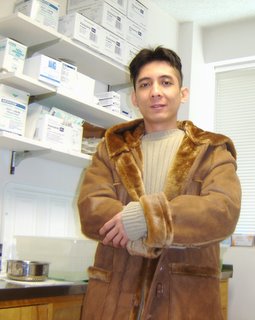 I asked the nurse if I could take pictures during the procedure. She said the doctor might not like it. She also remarked that it was her first time to encounter someone who intended to photograph such a procedure. She asked me what would those pictures serve me for; I just told her that writing and photography are two passions of mine. I added, "With photographs, articles and stories become alive and more credible and interesting."
I asked the nurse if I could take pictures during the procedure. She said the doctor might not like it. She also remarked that it was her first time to encounter someone who intended to photograph such a procedure. She asked me what would those pictures serve me for; I just told her that writing and photography are two passions of mine. I added, "With photographs, articles and stories become alive and more credible and interesting."Before returning home, Grandfather and I had snack at the building's cafeteria: oatmeal cookies and hot chocolate for Grandfather and a cold one for me.
Contacting a taxi company through the public telephone took about twenty minutes. Perhaps because it was rush hour, past four already. Also, good thing is, calling taxi companies through public telephones is free. All one needs to do is press the "TAXI" button.
I noticed that many of the taxi drivers were Indians (natives of India). I engaged the gentleman in a friendly conversation. I let him talk about his country. I felt the pride in him. He also didn't fail to ask little things about mine. He knew the Philippines. He even told me that he knew how to say "Salamat" and "Magandang araw." What stuck on my mind, however, was his remark after asking how old I was. When he learned that in January I'm turning 35, he complimented: "You don't look your age. In fact, I noticed that Filipino people look very young, unlike some other races."

In Hinduism, Ganesha is the elephant-headed deity regarded as a patron of learning, literature, intellect, and wisdom.
 To balance his perception somehow, I told him that not only many Filipinos but many fellow Asians as well, like Chinese and Japanese, look younger than their age. I could discuss with him the anthropological theories behind this but it would have been already too ponderous and time-consuming. Hahaha! Anyway, I returned the compliments by way of telling him that I am fascinated with his culture, especially with Indian musical instruments, Hindu deities, and their elaborate writing systems. I also mentioned that I particularly like the Hindu deity Ganesha because he is a patron of learning and literature.
To balance his perception somehow, I told him that not only many Filipinos but many fellow Asians as well, like Chinese and Japanese, look younger than their age. I could discuss with him the anthropological theories behind this but it would have been already too ponderous and time-consuming. Hahaha! Anyway, I returned the compliments by way of telling him that I am fascinated with his culture, especially with Indian musical instruments, Hindu deities, and their elaborate writing systems. I also mentioned that I particularly like the Hindu deity Ganesha because he is a patron of learning and literature.
He was amazed to learn that I, a young Filipino, knew so much about his culture. I'd like to believe that in this little way, I am contributing something positive about the Filipino people in general. I'm certain that the taxi driver would never fail to tell his family or friends that he met a young Filipino who knew many things about India. And this could cascade into his uttering of something general like, "Oh, Filipino people are good people; they appreciate the culture of our country."
Also, the cab driver was surprised when he learned that my name is aLfie. I was surprised as well when he told me his...Al—such smile-pulling coincidence!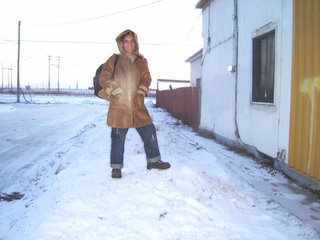 The fifteen-minute trip back home was insufficient for a nice conversation like that. Regardless, I believe that anyone can make something great in so short a time, especially when s/he's in a multiracial society—like exchanging simple yet substantial information especially that concerning culture and origin, correcting common misconceptions, and making other people feel confident and good about themselves.
The fifteen-minute trip back home was insufficient for a nice conversation like that. Regardless, I believe that anyone can make something great in so short a time, especially when s/he's in a multiracial society—like exchanging simple yet substantial information especially that concerning culture and origin, correcting common misconceptions, and making other people feel confident and good about themselves.
"For a dialogue to be fruitful, there must be mutual respect for each other’s humanity, culture, and rights. A dialogue is not true if it does not lead to an understanding of one another."


0 Comments:
Post a Comment
<< Home